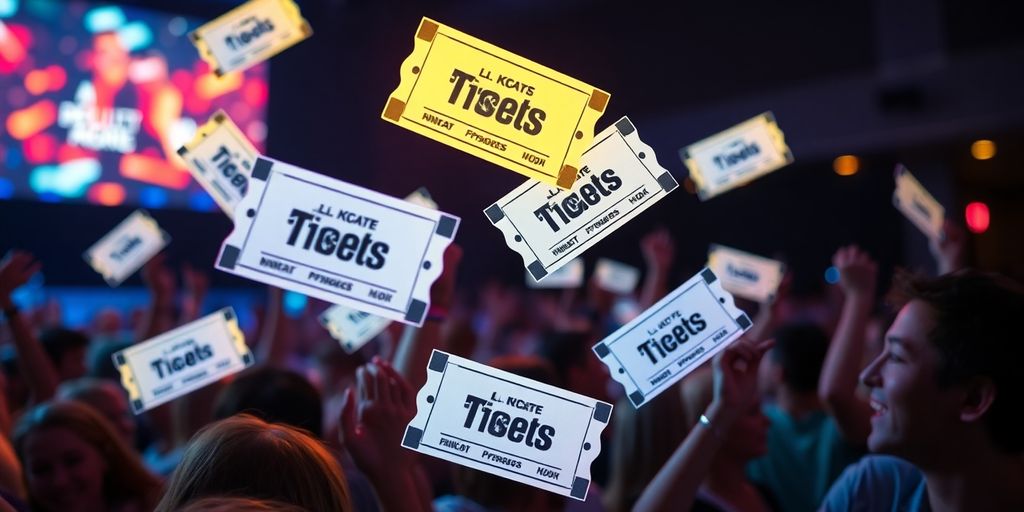Register as an organizer
Click the button below and finish your organizer registration, or fill out the form and we will be in touch to assist you.

Selling tickets online can feel like a puzzle, right? You've got this great event, but getting people to actually buy tickets can be a challenge. It's not just about putting tickets up for sale; there's a bit more to it if you want to see those sales numbers climb. We're going to break down how to make your online ticket sales work better, from picking the right tools to getting the word out effectively.
Picking the right place to sell your event tickets online is a big deal. It's not just about listing them; it's about making the whole process easy for people to buy and for you to manage. Think of it like choosing a store for your products – you want one that's reliable, easy to find, and has what you need.
There are tons of ticketing services out there, each with its own set of tools. Some are great for big concerts, others for small workshops. You'll want to look at how much they charge, what features they offer, and if they're easy for you and your customers to use. It’s important to find a service that fits the size and type of your event. For events in Canada, consider options like XTIX, known for their market adaptability and bilingual support.
When you're comparing different platforms, keep an eye out for a few key things. First, how easy is it to set up your event and start selling? You don't want to spend days figuring out complicated software. Second, what kind of reporting do they give you? Knowing how many tickets you've sold and where your buyers are coming from is super helpful. Also, check if they handle different types of payments, like credit cards and digital wallets. A platform that offers real-time analytics can really help boost your event's ticket sales.
Here's a quick look at some common features:
Think about how the ticketing platform will work with your existing website or other tools you use. Some platforms let you embed ticket sales directly onto your own site, which looks more professional and keeps people on your brand's page. Others might be standalone. The easier it is for people to find and buy tickets without jumping through too many hoops, the better your sales will be. A smooth process means fewer abandoned carts and happier customers.
Making the right choice here sets the stage for everything else. A clunky or expensive platform can really hurt your event before it even starts.

Your event page is often the first real look potential attendees get at what you're offering. It needs to be clear, exciting, and give people all the info they need to decide to buy a ticket. Think of it as your event's digital storefront.
When writing your event description, focus on what makes your event special. What's the main draw? Who is it for? Use language that paints a picture and gets people interested. Instead of just listing facts, tell a story about the experience attendees will have. Highlight the benefits of coming, not just the features. What will they learn, feel, or gain?
People are visual creatures. Good photos or graphics can make a huge difference. Use images that are clear, relevant to your event, and look professional. If you have a speaker or performer, include a good headshot. For a festival, show vibrant scenes from past events. A strong visual can grab attention much faster than text alone.
Make sure all the practical information is easy to find. This includes:
Attendees need to know exactly what they're signing up for. Missing details can lead to confusion and lost sales. Make it simple for them to get the information they need to feel confident about their purchase.
Social media is a really useful tool for getting people to your event page and selling more tickets. Think about using platforms like Instagram, Facebook, and even TikTok. You want to create posts that grab attention. This could be short videos showing what the event is about, or maybe some behind-the-scenes peeks. It helps build excitement. Don't forget to put a direct link to where people can buy tickets in your bio or in the post itself.
To really get people talking, try creating a unique hashtag for your event. Encourage attendees to use it when they post about the event. This is a great way to get user-generated content and spread the word naturally. You can also plan out a series of posts leading up to the event. Start with an announcement, then share updates about performers, food options, or any special merchandise. This builds anticipation.
Paid ads on social media can be super effective. You can target specific groups of people based on their age, what they like, or where they live. This means your ads are more likely to be seen by people who are actually interested in your event. It’s a smart way to reach a new audience that might not know about your event yet.
Make it super easy for people to find where to buy tickets. Every post, every story, every ad should have a clear call to action. If you're posting on Instagram, make sure the link in your bio is updated. If you're running ads, the ad itself should link directly to the ticket purchase page. The easier you make it, the more likely people are to click through and buy.
When you're posting on social media, pay attention to what works. Look at which posts get the most likes, comments, and shares. This tells you what your audience likes to see. You can then do more of that kind of content.
Getting people to buy tickets early can really help your event get off the ground. It's not just about getting cash in hand sooner, though that's nice. It's also about building buzz and showing that people are interested. Think of it as building momentum before the main event even starts.
Early bird pricing is a classic for a reason. You offer tickets at a lower price for a limited time. This rewards your most dedicated fans and encourages others to jump on board before the price goes up. You can offer a set discount, like $10 off, or a percentage off the regular ticket price. Another idea is to bundle early bird tickets with something extra, like a special merchandise item or early access to the venue. This adds more perceived value beyond just the discount. Remember to clearly state when the early bird pricing ends to create that sense of urgency.
Making it simple for people to buy tickets is a big deal. If the process is clunky or confusing, folks might just give up and look elsewhere. You want to make sure that from the moment they click to buy, it's a smooth ride. This means having a few key things in place to help them out.
People have different ways they like to pay for things. Some are old school and prefer using their credit or debit cards. Others are all about digital wallets like Apple Pay or Google Pay. Offering a mix of these options means you're not shutting anyone out. It’s like having multiple doors open instead of just one.
Think about the checkout page itself. Is it easy to find? Does it load quickly? Are there any confusing steps? You want to cut down on the number of clicks needed and make sure all the fields are clear. A simple, clean checkout page reduces the chance of someone getting frustrated and leaving. It’s better to have fewer fields than too many. If you can, let people buy tickets without having to create an account first. That’s a big win for many buyers.
This ties into offering diverse payment options, but it's worth highlighting separately. Make sure your system can handle major credit cards (Visa, Mastercard, American Express) and popular digital wallets. This covers most bases and shows you're keeping up with how people prefer to shop online. It’s a small detail that can make a big difference in your overall sales.

Once you've got your event up and running, it's easy to just let it be. But if you really want to boost those sales, you've got to look at the numbers. Think of it like checking the score during a game – you need to know what's working and what's not. This means keeping an eye on how many tickets are actually moving and where those buyers are coming from. Understanding your sales data is key to figuring out how to sell more tickets.
So, what should you be watching? A few things really stand out. You'll want to see your total ticket sales, of course, but also how many tickets are being sold each day or week. It's also helpful to know the average price people are paying. This gives you a good picture of your overall progress.
Here's a quick look at some important numbers:
Where are your ticket buyers actually coming from? Are they clicking links on social media, finding you through search engines, or maybe they saw an ad somewhere? Figuring this out is super important. You can use tracking codes or ask people how they heard about your event. Knowing which marketing channels are bringing in the most customers helps you focus your efforts and budget where it counts. This is a big part of understanding your sales pipeline.
After you've gathered all this information, it's time to make some smart decisions. If you see that Facebook ads are bringing in a lot of sales, maybe put more money there. If your email list isn't converting well, try changing up your messages. It’s all about tweaking your approach based on what the data tells you. Don't be afraid to experiment a little. You might find that a small change can make a big difference in how many tickets you sell.
Making data-driven decisions means you're not just guessing; you're acting on real information. This makes your marketing efforts much more effective and helps you reach your sales goals faster.
So, selling tickets online isn't just about putting them on a website. It's about picking the right place to sell, making your event page look good and tell people what they need to know, using social media to get the word out, giving people a reason to buy early, and making it super easy to pay. Keep an eye on your sales numbers too, so you know what's working. Do all this, and you'll be much more likely to sell out your event.
Picking the right place to sell your tickets online is super important. Think about what makes it easy for people to buy, if it works with your own website, and if it can handle different ways of paying. Some popular choices are Eventbrite, Ticketmaster, and SeatGeek, but there are lots of others.
Your event page is like your store window! Make it look good and give all the important details. Use cool pictures or videos so people know what to expect. Clearly state the date, time, and where it is. The easier you make it for people to find info, the more likely they are to buy tickets.
Social media is a great way to get the word out about your event. Share exciting posts, videos, or photos to get people interested. You can also pay to show ads to people who are likely to come. Make sure to put a link to your ticket page in your posts!
Offering a discount for people who buy tickets early is a smart move. It gets people excited and helps build buzz for your event. Make sure to tell everyone it's a limited-time deal to encourage them to buy right away.
Yes! Make it easy for people to pay by offering different options like credit cards, debit cards, PayPal, Apple Pay, and other digital wallets. The more ways people can pay, the more likely they are to finish their purchase.
Keep an eye on how many tickets you're selling and where your customers are coming from. See which ads or posts are bringing in the most buyers and do more of that. By understanding what works, you can sell more tickets.
More blogs
Click the button below and finish your organizer registration, or fill out the form and we will be in touch to assist you.